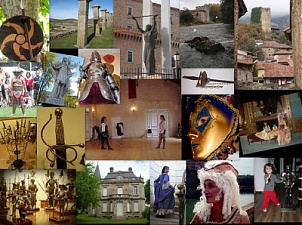Culture, EU – Baltic States, Good for Business, Investments, Modern EU
International Internet Magazine. Baltic States news & analytics
Monday, 22.12.2025, 06:13
Promoting cultural heritage in the European continent
 Print version
Print version |
|---|
There
is a special EU programme that supports the cultural and creative sectors
called “Creative Europe” with a total budget of about €1.5 billion for
2014-2020. The program supports organisations in the fields of cultural
heritage, performing arts, fine arts, interdisciplinary arts, publishing, film,
TV, music, and video games as well as tens of thousands of artists, cultural
and audio-visual professionals. The funding allows them to operate across
Europe, to reach new audiences and to develop the skills required in the
digital age.
The EU decided to designate 2018 as the European Year of Cultural
Heritage because of its symbolic and political importance. The
purpose of the European Year is to raise awareness of Europe's common history
and values, and to strengthen a European identity. Thousands of initiatives and
events across Europe will provide the possibility to involve citizens from all
backgrounds. The aim is to reach out to the widest possible audience, in
particular children and young people, local communities and people from all
backgrounds.
The slogan of the European Year of Cultural Heritage is “Our
heritage, where the past meets the future”. On
“Creative Europe” program see:
https://ec.europa.eu/programmes/creative-europe/
Presenting chosen “cultural projects”, Commissioner for education and culture, Tibor Navracsics,
underlined that the “transnational projects would showcase and promote cultural heritage in
all its different forms” as being the source of inspiration for contemporary
artistic creation and helping to build bridges between people from all
backgrounds.
He added that
“in the spirit of the European Year of Cultural Heritage these inspiring
projects would help reinforce a sense of belonging to a common European space".
The projects chosen vary, from the production of folk
costumes from different regions using traditional skills, to the exploration of
the Baroque era through music. Some are long-term educational projects designed
to help people learn about monuments and archaeological sites. One project will
highlight European food heritage through multimedia artwork. In addition to the
relevance and quality of the projects, another important selection criterion
was the potential of a project to maximise the impact by ensuring it reaches as
far as possible, locally, nationally and at the European level, to ensure that
citizens from all over Europe can be part of the experience.
A total budget of €5 million is allocated to the selected
29 projects. Dominating
were projects from Italy (12 submitted projects), France (9 submitted) and
Belgium (9 submitted) – 4 approved projects for each of these three states; grants
awarded varied from € 200 thousand to just € 60 thousand.
More in: https://eacea.ec.europa.eu/sites/eacea-site/files/coop3_selection_results.pdf
The Commission will propose at the end of May 2018 a new
programme for the 2021-27 financial period; initial Commission’s budget
projection for the future “Creative Europe” programme was about €1.85 billion.
Cultural community in the Baltic States shall be worried
that none of the projects from these countries have been approved; suffice it
to say that there were only two applications for financial support from Estonia
and Latvia (one from each state). Even small Serbia submitted 6 projects, of
which 3 were selected for support. See:
https://eacea.ec.europa.eu/sites/eacea-site/files/coop3_applications_by_country.pdf
More information in the following websites: -Press release on the
European Year of Cultural Heritage; - Q&As; - Website of the EYCH2018 campaign (including
a list of events at EU and national levels); -Special Eurobarometer
report on Cultural Heritage and country fiches
Spotlight publication;
- Factsheet "culture
as a driver for EU unity" - The Commission's Contribution to the Leaders'
Working Lunch Gothenburg, 17 November 2017; - Decision (EU) 2017/864 on
a European Year of Cultural Heritage.
General reference: http://europa.eu/rapid/press-release_IP-18-3901_en.htm/Commission
press release. 23.05.2018








 «The Baltic Course» Is Sold and Stays in Business!
«The Baltic Course» Is Sold and Stays in Business!

